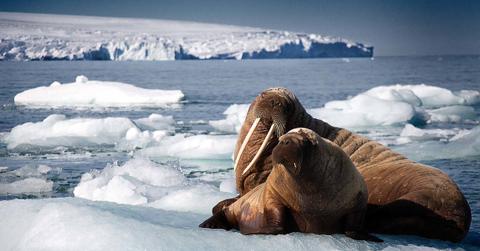BBC Documentary Highlights How Plastic Damages Our Environment
A new BBC documentary, "Blue Planet II," wrapped up filming and is slated to premiere in 2018 in the US. At the series launch event, naturalist behind the show, David Attenborough, spoke on how damaging plastic pollution is to our environment.
Updated May 24 2019, 2:25 a.m. ET
David Attenborough is a naturalist that has just ended production for Blue Planet II, a BBC series that focuses on how much pollution is affecting sea life. It’s a sequel to the original that featured eight hour-long episodes that focused on the history of our oceans. At a show launch party, Attenborough gave his reasons for why he believes global warming and plastic pollution are the biggest problems facing our oceans.
Plastic pollution has been called out frequently as studies continue to come out on how much damage it creates to our environment. The Guardian states that one million plastic bottles are purchased every minute. Most of our plastic waste is then discarded into the trash instead of recycled, then it finds its way into our oceans.
It’s become such a significant issue that’s it’s affecting our drinking water. In an investigation done by Orb Media, they found that 83 percent of water samples they tested were contaminated by plastic particles. In the United States, 94 percent of samples, ranging from government offices to residential buildings, had these particles in the water.
Does this contamination affect us personally? We don’t necessarily know the long-term effects as plastic is new in that department, but there’s many cases of it impacting marine life -- and wildlife altogether -- which is enough to raise a red flag. Attenborough gives an example of how an albatross could struggle feeding their young with this pollution.
“We’ve seen albatrosses come back with their belly full of food for their young and nothing in it. The albatross parent has been away for three weeks gathering stuff for her young and what comes out? What does she give her chick? You think it’s going to be squid, but it’s plastic. The chick is going to starve and die.”
From food preparation to drinking straight out of the tap, we’re all consuming plastic fiber. Attenborough is frustrated that we could be doing something about plastic, but we aren’t doing so at a high enough scale. Some examples he gave are cutting back on packaging and plastic bags, both of which can easily be replaced by eco-friendly methods.
Plastic is generally a cheaper alternative, so it’s the optimal choice for businesses. For example, plastic bags are cheaper to make and use less energy than paper bags. In some ways, paper bags are an even worse option, but the greenest alternative would be choosing the reusable bags. The only thing people have to sacrifice is convenience.
In addition to using plastic bags and containers less, there’s also been the removal of plastic straws in a few California cities and in Seattle. A movement from the Lonely Whale Foundation saw over 100 restaurants and organizations remove plastic straws, and they’re hoping to push that into numerous cities around the world in 2018. There’s also been the discovery of wax worms eating plastic waste for us.
Attenborough's Blue Planet II documentary will debut on BBC One on October 29th, 2017. It will air in the United States on BBC America at a future date in 2018.
